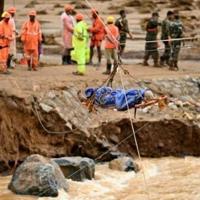According to a group of scientists, climate change was a significant factor in the devastating landslides caused by heavy rains in India last month, resulting in the deaths of at least 200 people.
In July, monsoon rains hit Kerala, triggering landslides in the Wayanad district, burying homes and residents under tons of rock and soil.
The World Weather Attribution, a network of scientists specialized in assessing the impact of climate change on extreme events, stated that the intense rainfall was clearly linked to a warming planet.
The analysis by 24 scientists found that human-caused climate change made the rainfall about 10 percent heavier, leading to the landslides. They highlighted that such heavy downpours were rare in Kerala before climate change.
The scientists explained that higher temperatures from fossil fuel emissions allow the atmosphere to hold more moisture, resulting in heavier rainfall. They also pointed out that a significant decrease in forest cover in the Wayanad region since 1950 has increased the risk of landslides by reducing slope stability.
Study member Mariam Zachariah from Imperial College London described the Wayanad landslides as a catastrophic example of climate change impacting real life situations.
Monsoon rains are critical for agriculture and water supply but also bring destruction. WWA warned that without rapid changes, heavier rainfalls and deadlier landslides will continue to occur.
India, the world’s third-largest emitter of greenhouse gases, has pledged to achieve a net zero emissions economy by 2070, heavily reliant on coal for power generation for now.
WWA scientist Arpita Mondal from the Indian Institute of Technology emphasized that as the climate warms and natural systems are disrupted, the threats to people in India will escalate.
ash/pjm/fox





